Parisian all star team conquered Europe
Kasparov came, dominated and won nothing * Podgorica took the crown in women's competition
by Harald Fietz, december 2003
Parisian all star team conquered EuropeKasparov came, dominated and won nothing * Podgorica took the crown in women's competitionby Harald Fietz, december 2003 |
NAO Paris and Internet Podgorica are the new club champions of Europe. Since the European Club Championship (ECC) moved to Greece three years ago the event has been growing stronger every year. In the wake of the match between Ponomariov and Kasparov being cancelled, even the number one in the world rating list became interested. For the first time the men's and the women's ECC were held together. 45 men's teams gathered in the Crete Star hotel (approx. ten miles east of Rethymnon, the third largest town on the Greek island of Crete), and 13 women teams played in the Panorama hotel three miles away. Due to organizational mis-management, both events could not take place in the same tournament hall, which would have created a typical festival atmosphere. However, 225 GMs and IMs made this ECC the strongest chess tournament in 2003. Six players out of the top ten and 33 GMs from the top 50 (including 13 of the 15 Russians - only Kramnik and Karpov were not present) constitute a better field than any olympiad. In the end, the number one in the starting list won for the first time (the six top boards in NAO Paris had a Elo average of 2693!). Nevertheless, for five rounds the pace was set by Kasparov and his Ladja Kazan team.
Kasparov's participation caused some surprise. According to ECC rules a player has to be on the team's playing list for last season's national team championships (any foreign player has to have played a minimum of two games). So far, little is known about the Kasparov-Kazan connection, and Belgian tournament director Dirk de Ridder is still waiting for an official document from the Russian chess federation. But organizational matters can take time in the Urals region, and nearly everybody wanted to see 'Big K' in action.
It must have been a new experience for Kasparov who is normally used to playing on a stage in top tournaments. This time he had to hunt for his board in a hotel ball room where - as in an ordinary open tournament - the teams were placed parterre, while the arbiters overlooked the games from the stage. Three arbiters had their hands full to ensure a cordon around Garry's board. Later they marked out a no-go area, and even Kasparov's second, Yuri Dokhoian, sometimes had difficulties in watching his boss's games.
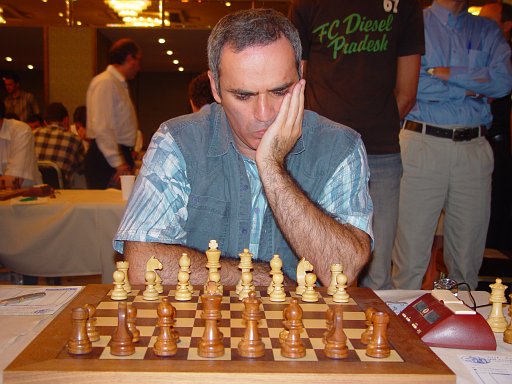
Garry Kasparov is waiting for some action. Photo: Harald Fietz
After a few minutes Kasparov had collected himself and rushed his pieces ahead in round one. Ukrainian-born Vladimir Chuchelov confessed afterwards: "If you are playing against Kasparov you have to cope with many things - not only his immense knowledge of the game but the atmosphere that surrounds his appearance. All this put me under a lot of pressure."
|
Kasparov,G (2830) - Chuchelov,V (2608) [E39]1.d4 Nf6 2.c4 e6 3.Nc3 Bb4 4.Qc2 c5 5.dxc5 0-0 6.a3 Bxc5 7.Nf3 b6 8.Bf4 Nh5 9.Bg5 Be7 10.h4 Bb7 11.0-0-0 Nc6 12.e4 Nf6 13.e5 Ng4 14.Bf4 Rc8 15.Kb1 f5 16.exf6 Nxf6 17.Ng5 Qe8 18.Nb5 e5 19.Bd3 e4 [ 19...exf4 20.Bxh7+ Kh8 21.Rhe1 Qd8 22.Bf5 ] 20.Be2 h6 21.Nd6 Bxd6 22.Bxd6 hxg5 23.hxg5 Nh7 24.Rxh7! Kxh7 25.Bxf8 Qxf8 26.Qxe4+ Kg8 27.Qd5+ 1-0 |
Kazan crushed Chuchelov's Belgian Rochade Eupen 6:0 and then greatly benefited from the pairing system, as the team faced Belfast Chess Club (which later finished at the bottom of the table and had only two Elo-rated players). Without Kasparov the Russians managed another 6:0. Due to these board points they had a permanent lead, whereas other teams faced much stronger opposition.
In rounds three and four Kasparov was back with further demonstrations of his superiority. Both games had a common theme, the importance of the initiative. Against rising Georgian star Baadur Jobava, he succeeded in keeping Black's king in the middle, and a fine pawn sacrifice opened space for his pieces.
|
Kasparov,G (2830) - Jobava,B (2596) [B12]1.e4 c6 2.d4 d5 3.e5 Bf5 4.Be3 Qb6 5.Qc1 e6 6.c4 Bxb1 7.Rxb1 Bb4+ 8.Kd1 dxc4 9.Nf3 Nd7 10.a3 Be7 11.Bxc4 Qc7 12.Ke2 Nb6 13.Bd3 Nd5 14.Bd2 h5 15.b4 Nh6 16.Re1 Rc8 17.Kf1 Qd7 18.Rb3 Nc7 19.Bg5 a6 20.Be4 Qd8 21.Bd2 Nf5 22.Rd3 g6 23.g3 Nd5 24.h3 Rc7 25.Kg2 Rd7 26.Rd1 Nb6 27.Qc2 Nd5 28.Rb3 Nc7 29.Bc1 Nd5 30.h4 Nc7 31.a4 Nxd4 32.Nxd4 Rxd4 33.Rxd4 Qxd4 34.Bxg6 Nd5 35.Be4 Nxb4 36.Qe2 b5 37.axb5 cxb5 38.Qf3 Nd5 39.Rd3 Qc4 40.Bd2 Rg8 41.Kh2 b4 42.Bxd5 exd5 43.Rxd5 Rg6 44.Rd3 Rc6 45.e6!? [ 45.Bxb4!! Bxb4 46.e6! ] 45...Qxe6 46.Re3 Qc4 47.Bxb4 Re6 48.Bxe7 Kxe7 49.Rc3 Qg4 50.Rc7+ Kd6 51.Qc6+ Ke5 52.Qc3+ Kd5 1-0 |
Against Alexander Chalifman's second, Konstantin Sakaev, a forced exchange of queens led to the domination of the only open file. In the final phase a good knight made life hard for the bad bishop.
|
Sakaev,K (2655) - Kasparov,G (2830) [D18]1.d4 d5 2.Nf3 Nf6 3.c4 c6 4.Nc3 dxc4 5.a4 Bf5 6.e3 e6 7.Bxc4 Bb4 8.0-0 Nbd7 9.Nh4 Bg6 10.h3 Bh5 11.Qb3 a5 12.g4 Bg6 13.Ng2 0-0 14.Nf4 e5 15.dxe5 Nxe5 16.Be2 Nfd7 17.Nxg6 Nxg6 18.Rd1 Nc5! 19.Rxd8 Nxb3 20.Rxa8 Rxa8 21.Rb1 Rd8 22.Bd1 [ 22.Ne4 Ne5 23.Kf1 Nd3 24.Bxd3 Rxd3 25.Ke2 Rd8 ] 22...Nxc1 23.Rxc1 Ne5 24.Bb3 Rd2 25.Rc2 Bxc3 26.bxc3 Nf3+ 27.Kf1 Kf8 28.Rc1 Ng5 29.Rc2 Ne4 30.Ke1 Rxc2 31.Bxc2 Nxc3 32.Kd2 Nd5 33.Bb3 Ke7 34.Kd3 Kd6 35.Kd4 f6 36.h4 h6 37.h5 Nc7 38.f4 Ne6+ 39.Kc4 Nc5 40.Bc2 Nxa4! 0-1 |
This was the build-up to the ultimate clash between the top contenders for the title in round five. NAO Paris trailed by two board points, but after four draws and a win by new Russian champion Peter Svidler against Dortmund 2003 winner Viorel Bologan (game below), after five and a half hours everything looked fine for the French side. But Kasparov knew what to do: another hour passed and Grischuk was tortured by White's bishops as Kasparov once again gave lessons in the art of attack.
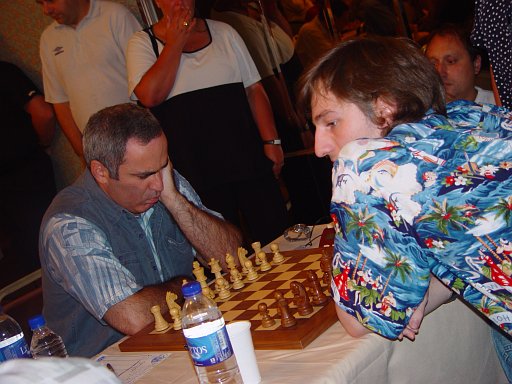
Kasparov - Grischuk. Photo: Harald Fietz
|
Kasparov,G (2830) - Grischuk,A (2732) [E32]1.d4 Nf6 2.c4 e6 3.Nc3 Bb4 4.Qc2 0-0 5.a3 Bxc3+ 6.Qxc3 b6 7.Bg5 Bb7 8.e3 d6 9.Ne2 Nbd7 10.Qd3 Ba6 11.b4 c5 12.b5 Bb7 13.Nc3 a6 14.f3 h6 15.Bh4 Qe7 16.Be2 cxd4 17.Qxd4 e5 18.Qd1 g5 19.Bg3 axb5 20.Nxb5 d5 21.0-0 Rac8 22.Qb3 Qe6 23.Qb4 Rc5 24.a4 Rfc8 25.Rfd1 Ba8 26.Ra3 g4 27.cxd5 Rxd5 28.e4 Rxd1+ 29.Bxd1 gxf3 30.gxf3 Nc5 31.Qb2 Nfd7 32.Qd2 Bc6 33.Nd6 Ra8 34.Be2 Qf6 35.Nf5 Kh7 36.Bc4 Ne6 37.Rd3 Ndc5 38.Rd6 Bxe4 39.Bxe6 Bxf5 40.Bxf7 Qg5 41.Qxg5 hxg5 42.Bxe5 Nd7 43.Bc3 Nc5 44.h4 gxh4 45.a5 bxa5 46.Rd5 Na4 47.Bd4 Bg6 48.Be6 Bc2 49.f4 Rb8 50.Rh5+ Kg6 51.Rg5+ Kh6 52.Bf7 Bd1 53.Kh2 Rd8 54.Bf6 Rc8 55.Be6 Rc6 56.Bg7+ Kh7 57.Bf5+ Kg8 58.Be4 Rc5 59.Bd5+ Kh7 60.Bd4 Rc2+ 61.Kh3 Rc7 62.Be4+ Kh6 63.Rg8 1-0 |
The 3:3 draw put Kazan in high spirits as they came up against Israeli outsider Beer-Sheva (12th in the starting list) in the next to the last round. With four wins out of four games, Kasparov's performance stood at 3014 Elo!
But all of a sudden, the unexpected happened. Taking a look into the mind of an outstanding chess artist at such a moment is virtually impossible, but it looks as if Kasparov suffered a classic blackout. After two hours and 20 moves, the maestro overlooked a tactical resource and thus conceded the fastest defeat in his career.
|
Huzman,A (2574) - Kasparov,G (2830) [D45]1.Nf3 d5 2.d4 Nf6 3.c4 c6 4.Nc3 e6 5.e3 a6 6.b3 Bb4 7.Bd2 0-0 8.Bd3 Nbd7 9.Qc2 Bd6 10.Ne2 c5 11.0-0 b6 12.cxd5 exd5 13.Ng3 Bb7 14.Nf5 Bc7 15.dxc5 bxc5 16.b4 c4 17.Be2 Ne4 18.Bc3 Nxc3 19.Qxc3 Nf6 20.Rfd1 Bc8 21.Rxd5 Qe8 22.Bxc4 1-0 |
Alexander Huzman, who had previously lost twice to Kasparov in clock handicap simuls in 1998 in Tel Aviv, put it in a nutshell in a down-to-earth statement: "Kasparov played an opening which he does not generally use. I did not expect this. Nevertheless, I do not value this win as much as I do the team success against 2001 winner Norilsk Nikel the previous day. Beer-Sheva has already caused many surprise successes in the history of the ECC."
Kasparov left the tournament hall without a word and his team colleagues seemed confused. Reliable Sergei Rublevsky lost to Boris Avrukh and it was only due to wins from Bologan (against Michael Roiz) and Artyom Timofeev (against Mark Tseitlin) that a team draw was saved.
Kasparov's shock defeat gave the green light for Paris' road to victory. They beat Tomsk-400 4.5:1.5 and delighted their patron Ms. Nahed Ojjeh, who arrived for the final day of the competition in order to watch the 4:2 win against Beer-Sheva. A look at individual results reveals the reasons for NAO's success.
1. NAO Paris |
|||
| 1. | Alexander Grischuk |
3.0/6 |
2657 |
| 2. | Peter Svidler |
5.5/7 |
2824 |
| 3. | Michael Adams |
4.5/7 |
2663 |
| 4. | Joel Lautier |
5.0/6 |
2813 |
| 5. | Francisco Vallejo Pons |
4.0/6 |
2656 |
| 6. | Etienne Bacrot |
4.0/5 |
2701 |
| 7. | Laurent Fressinet |
4.0/5 |
2660 |
(after player's name: points / number of games and performance) |
|||
Last year, NAO played with Grischuk and Svidler plus five French players and, although they had the undisputed lead with one round to go, they lost to Norilsk Nikel and dropped to fourth place. This time they strengthened their line-up with Michael Adams (who came from last year's winner Bosnia Sarajevo) and Francisco Vallejo Pons (playing his first ECC). This team composition provided a more stable framework for the rest: Etienne Bacrot and Laurent Fressinet decimated their opponents in the lower half, Svidler and Lautier scored many points and Grischuk tried to net as much as possible with his creative approach. Here is a typical game at the top board against a player from Belarus Minsik (who also played a good tournament with a 2666 performance).
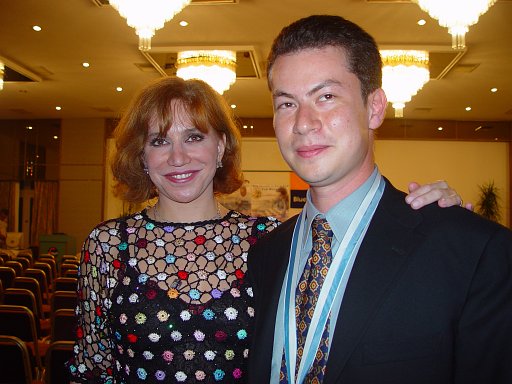
Happy winners: Nahed Ojjeh and Joel Lautier. Photo: Harald Fietz
Svidler proved to be the go-to-guy as he was in fantastic form. In mid-August, the man from St. Petersburg won the unofficial Chess960 World Championship against Peter Leko in Mainz (during the Chess Classic), in the first half of September he won the Russian Championship in Krasnoyarsk ahead of Alexander Morozevich (both 7.5/9), then he scored decisive points during NAO's crusade and finally he led Russia to gold in the European Team Championship in Plovdiv, Bulgaria, in mid-October. In the absolutely important game against Kazan he came up with a stunning novelty at move 13.
|
Svidler,P (2723) - Bologan,V (2650) [B90]1.e4 c5 2.Nf3 d6 3.d4 cxd4 4.Nxd4 Nf6 5.Nc3 a6 6.f3 e6 7.Be3 Be7 8.g4 Nc6 9.Qd2 0-0 10.0-0-0 Nxd4 11.Qxd4 Nd7 12.g5 Bxg5 13.Rg1! [ 13.Bxg5 Qxg5+ 14.Kb1 Ne5 15.Qxd6 Nc6 16.Be2 Rd8 17.Qc7 Kf8 18.f4 Qe7 19.Qb6 Bd7 20.Na4 Be8 ( 20...Qb4? 21.Qxb4+ Nxb4 22.Nb6 Bc6 23.Nxa8 Rxa8+- ) 21.Nc5+/= ] 13...e5 [ 13...Bxe3+ 14.Qxe3 Ne5 15.Be2 Qc7 16.h4 Qc5 17.Qg5 Ng6 18.h5 Qxg5+ 19.Rxg5 f6 20.Rg4 ( 20.Rg3 Nf4! ) 20...Ne5 21.Rg3 Rd8 22.f4 Nc6 ] 14.Bxg5 exd4 15.Bxd8 dxc3 16.Be7 cxb2+ 17.Kxb2 Re8 18.Bxd6 g6 19.Rg5 Nf8 20.Rc5 Ne6 21.Rc3 Bd7 22.Be5 Bc6 23.Bf6 Rec8 24.Bc4 Nc5 25.Re3 Na4+ 26.Kc1 b5 27.Bb3 Nb6 28.Rd4 Be8 29.f4 Rc6 30.e5 Rac8 31.f5 Nc4 32.Re2 R6c7 33.fxg6 fxg6 34.e6 Rc6 35.Bg5 Kg7 36.Rd7+ Kg8 37.Bh6 Nd6 38.Rxd6 Rxd6 39.Rf2 1-0 |
All this put multi billionaire Nahed Ojjeh in a relaxed mood when asked about her feelings and future plans: "At the moment I'm merely happy. I will continue to support the team. We will become stronger and stronger. My plan is to have the best chess club in the world." The future will tell whether these ambitions can be met.
Silver and bronze medals did not go to Russia either. Polonia Plus Warsaw, the team from the Polish capital, is sponsored by a telecommunication company and has great experience in the ECC (2001 second place, 2002 third place). The Polish national team plus two super grandmasters denied Kazan second place when they won 4:2 in the final round. Performance results show that they had a very well-balanced team.
2. Polonia Plus Warsaw |
|||
| 1. | Vassil Ivanschuk |
5.0/7 |
2824 |
| 2. | Boris Gelfand |
3.5/6 |
2706 |
| 3. | Bartolomiej Macieja |
5.5/7 |
2818 |
| 4. | Tomasz Markovski |
3.5/6 |
2618 |
| 5. | Michal Krasenkov |
4.0/6 |
2638 |
| 6. | Robert Kempinski |
5.0/6 |
2798 |
| 7. | Bartosz Socko |
2.5/4 |
2536 |
Bosnia's Kiseljak (30000 population village some 20 miles from Sarajevo) recorded a very strange success story. With a 3.5:2.5 result against Alkaloid Skopje in the final round, they pushed the latter into third place although they had not played against any team in the top seven. Hungarian Zoltan Almasi and Belarusan Aleksei Aleksandrov scored best.
3. Kiseljak |
|||
| 1. | Zurab Azamaiparashvili |
4.0/7 |
2596 |
| 2. | Zoltan Almasi |
5.0/7 |
2631 |
| 3. | Aleksei Aleksandrov |
5.5/7 |
2618 |
| 4. | Predrag Nikolic |
4.5/7 |
2513 |
| 5. | Alexei Fedorov |
5.5/7 |
2561 |
| 6. | Mladen Palac |
4.5/7 |
2391 |
Four Russian teams came to Crete and not one got a medal. A bitter lesson for the world's best chess nation. Norilsk Nikel had to content itself with fourth position, but was not aiming for a top three place as it only drew with Tomsk-400 and lost to Beer-Sheva. Ladja Kazan at number five met their Waterloo after round five. After Kasparov's faux pas the team never looked the same. St. Petersburg finished in sixth position but lost two decisive matches against Russian rivals (2:4 against Kazan and 2.5:3.5 against Tomsk-400). A year before the 400th birthday of the city, Tomsk-400 only reached eleventh place, as its central axis (Michail Kobaliya at board three and Andrei Belozerov at board four) scored below average.
Another major disappointment was defending champion Bosnia Sarajevo. The four times winner had an impressive line-up with Evgeny Bareev, Alexei Shirov, Ivan Sokolov, Rustam Kasimdzhanov, Kiril Georgiev, Bojan Kurjica and Zenko Kozul, but they lost momentum as early as round two when they went under to St. Petersburg. Even their top scorer Shirov (5.5/7 performance 2795) could not help them in this match although he played in his ultra-imaginative style. However, the queen sacrifice only proved to be enough for a draw.
|
Shirov,A (2732) - Volkov,S (2620) [C12]1.e4 e6 2.d4 d5 3.Nc3 Nf6 4.Bg5 Bb4 5.e5 h6 6.Be3 Ne4 7.Qg4 g5 [ 7...g6 8.a3 Bxc3+ 9.bxc3 Nxc3 10.Bd3 Nc6 11.h4 Qe7 12.Nh3 Bd7 13.h5 gxh5 14.Qf3 Qh4 15.Qf4 Qxf4 16.Nxf4 0-0-0 17.Rxh5 Ne7 18.f3 a6 19.Kd2 Na4 20.Rah1 Bb5 21.Rxh6 Rxh6 22.Rxh6 Bxd3 23.cxd3 c5 24.dxc5 d4 25.Bf2 ] 8.h4 h5 9.hxg5 hxg4 10.Rxh8+ Bf8 11.Nxe4 dxe4 12.Ne2 c5 13.0-0-0 Qa5 [ 13...Nd7 14.g6 fxg6 15.Nf4 Qe7 ( 15...cxd4 16.Nxe6 Qa5 17.Ng7+ Kd8 ( 17...Kf7? 18.Bc4+ Kxg7 19.Rg8+ ) 18.Rxd4 ) 16.Bc4 b5 ( 16...cxd4 17.Nxe6 dxe3 18.Nc7+ Kd8 19.Ne6+ Qxe6 20.Bxe6 e2 ) 17.Nxe6 bxc4 18.Nc7+ Kd8 19.Nd5 cxd4 20.Nxe7 Kxe7 ( 20...dxe3? 21.Nxc8 Kxc8 22.fxe3 Kc7 23.Rh7+- ) 21.Rxd4+/= ] 14.Nc3 cxd4 15.Bxd4 [ 15.Nxe4 Nc6 16.Nf6+ Ke7 17.Bxd4 Nxd4 18.Rxd4 Qe1+ 19.Rd1 Qxe5 20.Ng8+= ] 15...Nc6 16.Nxe4 Nxd4 [ 16...Nxd4 17.Nf6+ Ke7 18.Rxd4 ( 18.Ng8+? Kd7 19.Nf6+ ( 19.Rxd4+ Kc6 20.Nf6 Qxe5 21.Rc4+ Bc5 22.b4 b6 23.bxc5 bxc5-+ ) 19...Kc6-+ ) ] 1/2-1/2 |
The ECC is not only a stage for the chess elite but also a show room for rising stars. These young talents mainly originate from former Soviet Union (CIS) countries. This year Ukraine, Belarus and Georgia sent their best youngsters. A. V. Momot (formerly known as Danko Donbass) is now named after former president, Alexander V. Momot of the Danko company, who was assassinated in 1996 during rivalry in the business of monopolistic gas and coal markets in the Donetz region. Since 1998 Danko has put a lot of money into the chess school in Kramatorsk. Gennadi Kuzmin, who played top board in Crete, is head coach of a boarding chess school where Ponomariov and Kariakin have already studied the game. Currently 15 pupils out of 200 are at the top of the selection process. Among them is Kateryna Lahno who many regard as a second Judit Polgar.
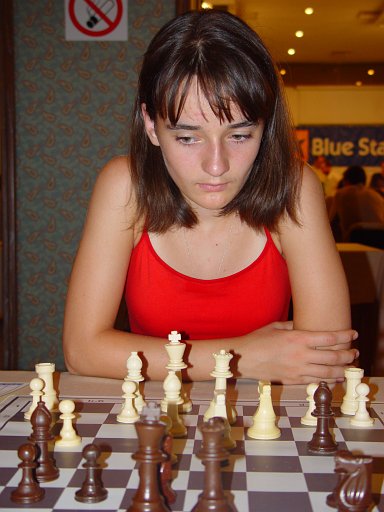
The rising star in women chess: Kateryna Lahno. Photo: Harald Fietz
This summer the 13 year old female grandmaster went on the rampage for a man's title. In June at the Male European Championship she achieved her first male IM norm, in August she managed a GM norm at home in Kramatorsk and in Crete she added another IM norm. The brown-haired girl looks like a normal kid and finishes her games effortlessly. Besides draws with GMs Sergey Ivanov (St. Petersburg) and former world championship candidate Predrag Nikolic, she beat Tomsk's GM Belozerov in a game with unusual material composition in the middle-game.
|
Belozerov,A (2541) - Lahno,K (2431) [E32]1.d4 Nf6 2.c4 e6 3.Nc3 Bb4 4.Qc2 0-0 5.e4 d5 6.e5 Ne4 7.a3 Bxc3+ 8.bxc3 c5 9.Bd3 cxd4 10.cxd4 Qa5+ 11.Kf1 f5 12.exf6 Nxf6 13.Bd2 Qc7 14.cxd5 Qxc2 15.Bxc2 exd5 16.Bb4 Re8 17.f3 Nc6 18.Ne2 Bd7 19.Bd3 Re3 20.Rd1 Rae8 21.Be1 Bf5 22.Bxf5 Rxe2 23.Bd2 Nxd4 24.Bd3 R2e6 25.Kf2 a6 26.Rhe1 Kf7 27.Rxe6 Nxe6 28.Rc1 Re7 29.Ba5 g6 30.a4 Nd7 31.Bb4 Ne5 32.Bf1 Rd7 33.g3 Nd4 34.Rc8 Ndc6 35.Bd2 Kg7 36.f4 Nc4 37.Be1 Nb6 38.Re8 Nxa4 39.Bg2 Nc5 40.Bc3+ d4 41.Ba1 Nb3 42.Bb2 Nca5 43.Bh3 Rc7 44.Ba3 Nc4 45.Bb4 a5 46.Bf8+ Kf7 47.Rd8 Ne3 48.Bd6 Rc2+ 49.Kg1 Nf5 50.Be5 Rc1+ 51.Kf2 Nc5 52.g4 Nd3+ 53.Ke2 Nxe5 54.gxf5 d3+ 55.Kd2 Rc2+ 56.Kd1 Nc4 57.Rxd3 Rxh2 58.Rd7+ Kf6 59.Rxh7 Ne3+ 60.Ke1 Nxf5 61.Kf1 a4 62.Kg1 Rb2 63.Bg2 a3 64.Bd5 Ng7 65.Rh8 Ne6 66.Ra8 Nxf4 67.Bg8 Kg7 0-1 |
Among the six GM norms at the ECC, norms for the Zhigalko brothers from Vesnianka Minsk stand out particularly. 18 year old Andrei, who is already an IM, played at board two, and 14 year old Sergei, who won the European U-14 championships a week before in Budva, played at board three. Not only their Elo performance results (2613 and 2583 respectively) show their potential but also the quality of their play: for example, Sergei easily drew a rook ending with a pawn down against Adams, and Andrei overcame former world class GM Gyula Sax of Hungary.
|
Zhigalko,A (2466) - Sax,G (2521) [B80]1.e4 c5 2.Nf3 e6 3.d4 cxd4 4.Nxd4 Nf6 5.Nc3 d6 6.Be3 Nc6 7.Qd2 Be7 8.f3 0-0 9.0-0-0 d5 10.exd5 Nxd5 11.Nxd5 exd5 12.Bb5 Qc7 13.Rhe1 Bf6 14.Kb1 Bd7 15.Nb3 Bf5 16.g4 Bg6 17.Bf4 Be5 18.Bxe5 Nxe5 19.Rxe5! Qxe5 20.f4 Qe6 [ 20...Bxc2+ 21.Kxc2 Rac8+ 22.Kb1 Qf6 23.g5 Qd6 24.Bf1 Rfd8 25.Bg2 ] 21.f5 Bxf5 22.gxf5 Qxf5 23.Nd4 Qg4 24.Be2 Qg2 25.Qf4 Rae8 26.Bd3 g6 27.h4 h5?! [ 27...f5!? 28.Rf1 ( 28.h5 Qg4 29.Qxg4 fxg4 30.hxg6 h5 31.Bf5 ) 28...Qg4 29.Qf2 f4 30.Rg1 Qh5 31.Be2 Qe5 32.h5 Qe3 33.Qxe3 Rxe3 ( 33...fxe3 34.hxg6 hxg6 35.Rxg6+ Kf7 36.Rg3 Re5 37.c3+/- ) 34.Bf3 ( 34.hxg6 f3 35.gxh7+ Kxh7 36.Bxf3 Rexf3 37.Nxf3 Rxf3 38.c3+/= ) 34...Re5 35.hxg6 hxg6 36.Rxg6+ Kf7 37.Rg1+/- ] 28.Rf1 Re7 29.a3 Rfe8 30.Ka2 a6 31.Qh6 Re4 32.Nf3 Rg4 33.Ng5 Rxg5 34.hxg5 Re6 35.Rf6 Qg4 36.Bxg6 1-0 |
Other talents to watch out for are 17 year old Levan Pantsulaia from Tblissi (GM norm at board six with 6/7 and performance of 2788) and 12 year old Magnus Carlsen from the European peripheral country of Norway (final IM norm at top board with 3.5/7 and performance of 2501).
Since the mid-1990s, the world's strongest national league, the German Bundesliga, has not been able to convince its top teams to enter the European level. If Lübeck, winner of the last league three titles, had had its six boards as in the 2002/03 season available the team could easily play for first place: Adams, Grischuk, Schirov, Lautier, Ephishin, Fressinet. This indicates the problem, as many players compete in more than one country. For the ECC they normally choose their home country or the best financial offer and many German teams are not willing to invest in the extra event as entering fifteen Bundesliga rounds has already cost a lot of dough. Things look even more bleak in the future as Lübeck withdrew its team two weeks before the start of the new season (rumors about financial troubles for its main sponsor which produces digital decoders)! This time Werder Bremen, which at national level finished third last year, was happy to receive extra support as a branch of the successful soccer club. Schachfreunde Neukölln (a district of Berlin) only got a proportion of travel costs from public funds, and all players covered their own costs.
Nevertheless, Berlin-based chess journalist Dirk Poldauf contributed to a remarkable moment for Neukölln, when he beat Rustam Kasimdzhanov who recently moved to Germany and is now seeking German citizenship. Until 1999 Poldauf played for Empor Berlin, the former top club from East Berlin where Vladimir Kramnik and Shirov once sat side by side! During a training session in 1993, 18 year old Kramnik demonstrated an interesting idea in a then topical line in the English opening. Not too much happened since then, as a brand-new opening book (Alex Raetsky / Maxim Chetverik "English …e5 - the reversed Sicilian lines" Everyman books) suggests: "Against 4…e4 it is fine to play 5.d4, while 5.Ng5!? demands practical tests." Reality has already caught up with the two IMs from Voronezh!
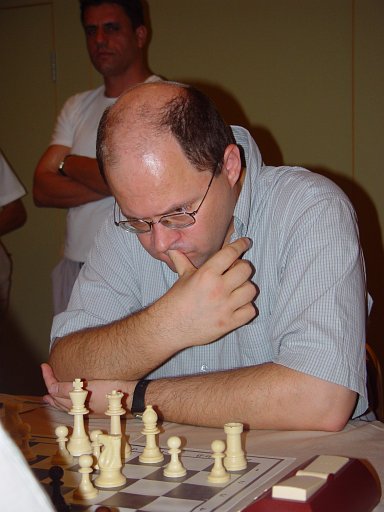
Dirk Poldauf remembered some advice from Vladimir Kramnik. Photo: Harald Fietz
|
Poldauf,D (2404) - Kasimdzhanov,R (2664) [A21]1.c4 e5 2.Nc3 Bb4 3.Nd5 Bc5 4.Nf3 e4 5.Ng5 e3 [ 5...Qxg5?! 6.Nxc7+ Kd8 7.Nxa8 Qf6 8.e3 b6 9.Qa4 Nc6 10.Rb1 ; 5...c6 6.Nxe4 cxd5 7.Nxc5 b6 8.Na4!? dxc4 9.d3 ] 6.d4 exf2+ 7.Kxf2 Be7 8.Nxe7 Qxe7 9.e4 d6 10.h3! [ 10.Bd3 Nc6 11.Bc2 Nf6 12.Re1?! ( 12.h3! ) 12...Bg4! 13.Qd3 Nd7! 14.Ba4 h6 15.e5?! ( 15.Nf3 Bxf3 16.gxf3 Qh4+ ; 15.Qg3 Qf6+! ) 15...dxe5 16.d5 Nd4 17.Qe4 Be2 18.Nh3 b5 19.Bxb5 Nxb5 20.Qxe2 Nd4 21.Qd1 Qh4+ 22.Kf1 0-0 23.Be3 Nf5 24.Qc2 Nxe3+ 25.Rxe3 f5 ] 10...Nc6? 11.Nf3 f6 12.Bd3 Qf7 13.Rf1 Nge7 14.Kg1 Qh5 15.a3 0-0 16.b4 a6 17.Ra2 Qe8 18.Re2 Ng6 19.Qe1 Bd7 20.Qg3 Nce7 21.Rfe1 Rd8 22.Bb2 Be6 23.h4 h5 24.Re3 b6 25.c5 bxc5 26.bxc5 dxc5 27.d5! Bg4 28.Qxc7 Bxf3 29.gxf3 Rd7 30.Qg3 Qb8 31.Qxb8 Rxb8 32.Ba1 a5 33.a4 Nc8 34.Bb5 Rdb7 35.Bc3 Nd6 36.Bf1 Ra8 37.Kh2 Ne5 38.Kg3 Ndc4 39.R3e2 Rb3 40.Rc2 Na3 41.Rcc1 Nd7 42.Bh3 Nb6 43.d6 c4 44.e5 fxe5 45.Rxe5 Ra7 46.Be6+ Kh7 47.Bf5+ 1-0 |
The start of the women's event was marked by an unexpected approach. Team captains demanded to play according to the new FIDE time limit (90 minutes plus 30 seconds increment per move), whereas the men preferred more quality (100 minutes / 40 moves plus 30 seconds / 50 minutes / 20 moves plus 30 seconds and thereafter 30 seconds for every move). It seemed some ladies might be confusing a high class chess event with a holiday trip!
In the end the title remained in Serbia and Montenegro, as Internet Podgorica snatched the trophy from last year's winner BAS Belgrade, beating them 2.5:1.5 in the final round. Belgrade even slipped to fourth place as the talented squad of young Georgians of NTN Tblissi moved into second place. This was well-deserved as they had been in the lead for five rounds before they drew with Kazan and lost to Belgrade 1.5:2.5. Third place went to Ladja Kazan, because Alisa Galliamova, having vacated her place at board six in the men's team for Kasparov, played an outstanding tournament (6/7 performance 2696). The remaining three Russian players only scored half the possible points!
Favourite ULIM Chisinau from Moldavia will remember a disappointing campaign although they had Almira Skripchenko (European Champion in 2001) and Antoaneta Stefanova (European Champion in 2002) at top boards. The disaster started as early as round three when Skripchenko mishandled a position in the ten first moves!
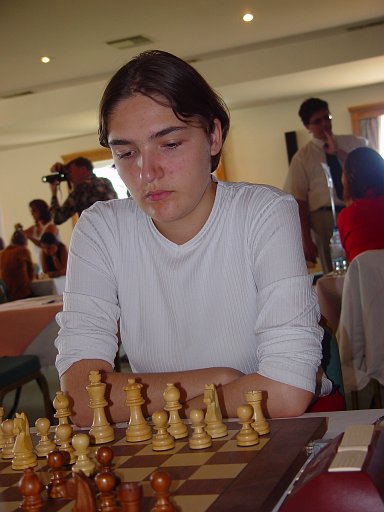
Nana Dzagnidze crushed former European Champion Almira Skripchenko. Photo: Harald Fietz
|
Dzagnidze,N (2446) - Skripchenko,A (2489) [D02]
1.d4
d5
2.Nf3
c5
3.dxc5
Nc6
4.e4
d4
5.c3
e5
6.Bb5
Bxc5
7.Nxe5
Nge7
8.Nxf7
Qb6 [
8...Kxf7
9.Qh5+ ] |
However, Lautier's ex-wife might have a better time next year when she may join a French team. Ms Ojjeh has already declared that she is also aiming to bring together a women's super team. It looks like the 2004 ECC in Istanbul will again be an exciting affair.
Final standing ECC 2003 (Men) |
||||
1. |
NAO Paris |
(FRA) |
13 |
30,0 |
2. |
Polonia Plus Warsaw |
(POL) |
12 |
29,0 |
3. |
Kiseljak |
(BIH) |
12 |
29,0 |
4. |
Norilsk Nikel |
(RUS) |
11 |
26,5 |
5. |
Ladja Kazan |
(RUS) |
10 |
28,5 |
6. |
St. Petersburg L.T.G. |
(RUS) |
10 |
27,5 |
7. |
Beer-Sheva Chess Club |
(ISR) |
10 |
25,5 |
8. |
Tblissi |
(GEO) |
10 |
22,0 |
9. |
Alkaloid Skopje |
(MKD) |
9 |
30,5 |
10. |
Zalaegerszeg-Hydrocomp |
(HUN) |
9 |
27,0 |
11. |
Tomsk-400 Yukos |
(RUS) |
9 |
25,0 |
12. |
Werder Bremen |
(GER) |
9 |
25,0 |
13. |
Polfa Grodzisk |
(POL) |
9 |
24,5 |
14. |
VCH Vitebsk |
(BLR) |
8 |
26,5 |
15. |
Corpora Martin |
(SVK) |
8 |
25,5 |
16. |
Bosnia Sarajevo |
(BIH) |
8 |
25,0 |
17. |
A. V. Momot Chess Club |
(UKR) |
8 |
24,0 |
18. |
Vesnianka Minsk |
(BLR) |
8 |
23,5 |
19. |
Clichy Echecs 92 |
(FRA) |
8 |
23,0 |
20. |
Barbican Chess Club |
(ENG) |
8 |
22,0 |
21. |
TZ Trinec |
(CZE) |
7 |
24,0 |
22. |
ASA Tel Aviv |
(ISR) |
7 |
23,0 |
23. |
SK Eynatten |
(BEL) |
7 |
22,5 |
24. |
'Drita' Therande |
(ECU)* |
7 |
22,5 |
25. |
Limhamns SK |
(SWE) |
7 |
20,5 |
26. |
Skolernes Aarhus |
( DEN) |
7 |
20,0 |
27. |
Rochade Eupen |
(BEL) |
6 |
21,5 |
28. |
Joensuu Chess Club |
(FIN) |
6 |
20,0 |
29. |
Schachfreunde Neukölln |
(GER) |
6 |
18,5 |
30. |
AO Kydon Chania |
(GRE) |
6 |
18,0 |
31. |
Asker Schachclubb |
(NOR) |
6 |
18,0 |
32. |
Cercle Royal Liege |
(BEL) |
6 |
16,0 |
33. |
SK Glasinac |
(SCG) |
6 |
16,0 |
34. |
Shakki Jyväskylä |
(FIN) |
6 |
15,0 |
35. |
Sparkasse Gleisdorf |
(AUT) |
5 |
18,0 |
36. |
Cardiff Chess Club |
(WLS) |
5 |
16,5 |
37. |
Austria Graz |
(AUT) |
5 |
15,0 |
38. |
OAA Heraklio |
(GRE) |
4 |
16,5 |
39. |
Hellir Chess Club |
(ISL) |
4 |
16,0 |
40. |
TED Ankara |
(TUR) |
4 |
15,0 |
41. |
'de Sprenger' Echternach |
(LUX) |
4 |
13,0 |
42. |
SV Tschaturanga |
(AUT) |
4 |
12,5 |
43. |
Nidum Liberals Chess Club |
(WLS) |
3 |
11,5 |
44. |
Phibsboro Chess Club |
(IRL) |
3 |
9,0 |
45. |
Chess Club Belfast |
(IRL) |
2 |
7,0 |
(after the club name: country, team points, board points) |
||||
Final standing ECC 2003 (Women) |
||||
1. |
Internet Podgorica |
(SCG) | 11 |
19,5 |
2. |
NTN Tblissi |
(GEO) | 11 |
18,0 |
3. |
Ladja Kazan |
(RUS) | 10 |
17,0 |
4. |
BAS Belgrade |
(SCG) | 9 |
17,0 |
5. |
Cannes CC |
(FRA) | 9 |
17,0 |
6. |
ULIM Chisinau |
(MDA) | 8 |
15,5 |
7. |
St. Petersburg L.T.G |
(RUS) | 8 |
15,0 |
8. |
South Ural Chelyabinsk |
(RUS) | 8 |
14,5 |
9. |
Tomsk-400 Yukos |
(RUS) | 7 |
13,5 |
10. |
Kristallen SK |
(SWE) | 6 |
10,0 |
11. |
Maccabi Afek |
(IRS) | 6 |
10,0 |
12. |
AO Kydon Chania |
(GRE) | 3 |
8,0 |
13. |
Hellir Chess Club |
(ISL) | 3 |
7,0 |
an abridged version appeared in the new US chess magazine "Squares", Fall 2003 www.squares64.com